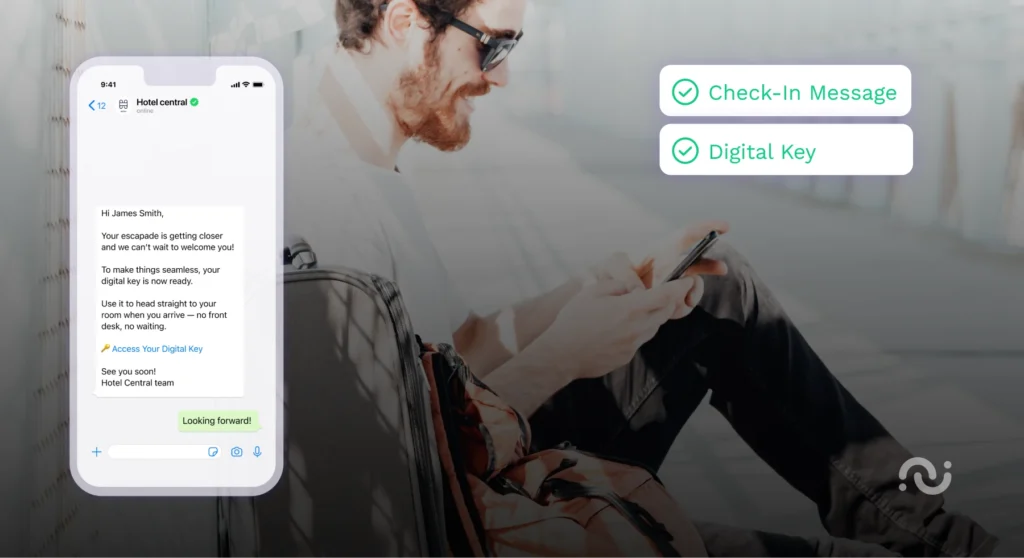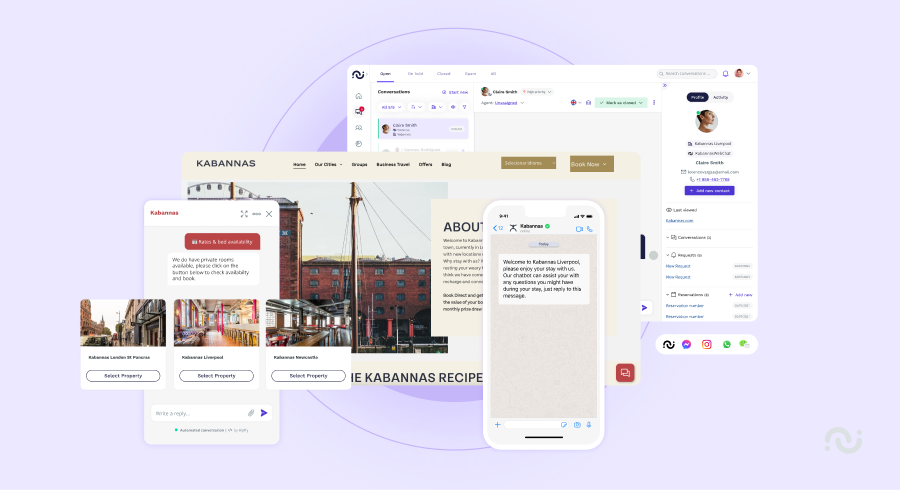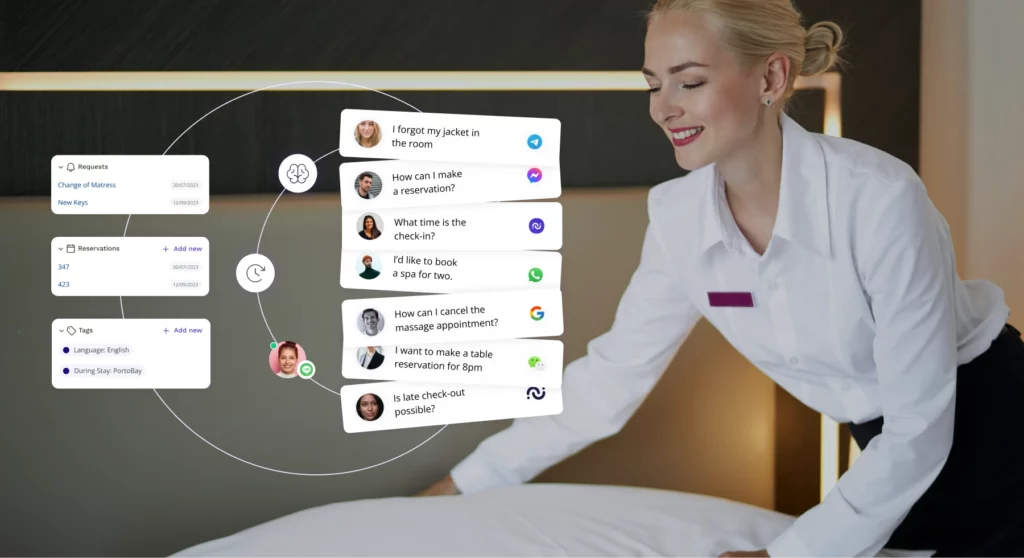All cards are on the table. What's your pick?
Agentic AI has moved from being just a talked-about concept to an actual tool for a competitive advantage. Hotels are facing rising guest expectations, staff shortages, and the challenge of increasing direct bookings. To tackle these issues, many are turning to AI agents as a practical solution to fill the gaps and keep operations running smoothly.
Unlike traditional chatbots, a hotel AI agent doesn’t just respond. It takes initiative. It understands guest context, makes decisions, and carries out tasks from start to finish. It’s important to make one thing clear from the start – this new generation of hotel technology doesn’t replace staff, but is developed to support them. By handling repetitive requests and operational admin, AI agents give teams more time to focus on what matters most: delivering exceptional hospitality.
The key is choosing an AI solution purpose-built for hospitality: trained on hotel data, connected to your current hotel systems, and able to act, not just reply. That’s where advanced, hotel-specific AI agents come in. They’re already making a measurable impact across guest messaging, upselling, task automation and beyond.
In this article, we’ll break down what agentic AI is, how hotels are already putting AI agents to use, and why now is the right time to consider one for your operations.
Agentic AI refers to artificial intelligence that can independently take purposeful actions without constant human supervision. These systems don’t just react, but analyse, plan, and make decisions based on the situation in real time.
A hotel AI agent can independently manage a guest request, follow up with the relevant team, confirm task completion, and notify the guest, without needing manual oversight. That’s what sets agentic AI apart from traditional automation or scripted chatbots, which are limited to predefined responses and static decision trees.
Think of it this way: while a standard hotel chatbot might provide check-in times when asked, a hotel AI agent can detect an intention for an early arrival, offer an upselling offer for early check-in, coordinate with housekeeping, and confirm the room’s readiness – all through one conversation.
This level of autonomy makes agentic AI a powerful tool for hotels aiming to streamline operations and improve guest experience. But only when the AI is purpose-built for hospitality, something that generic solutions often fall short on.

Hotels are under pressure to “do more with less” – a challenge nobody likes to face. Staff shortages persist. Operational costs are rising. Guest expectations are higher than ever: instant responses, personalisation, and frictionless experiences are now standard.
This is where agentic AI for hotels is a new big opportunity for hospitality. Unlike rule-based automation or basic chatbots, AI agents powered by conversational AI can think and act within complex hotel workflows. They relay information and also take initiative to solve problems, drive revenue, and support teams.
For example, a hotel AI agent can:
This innovative and autonomous system means faster service, happier guests, and better efficiency across your hotel. Fully integrated with your existing systems, an AI agent setup can simplify operations instead of adding extra layers of complexity.
Hotels that adopt agentic AI now are setting a foundation not just for automation, but for smart, responsive operations at scale.
Update from October 2025: Now it’s even more important with the arrival of agentic AI browsers – make sure to read our guide on how hotels should prepare for ChatGPT Atlas.

Agentic AI is already reshaping hotel operations. From front desk to housekeeping, AI agents are taking on tasks that previously required manual coordination or guest-facing staff. Here are five example applications showing how a hotel AI agent can drive value across the guest journey:
Guests ask for towels. The AI agent checks room status, routes the request to housekeeping, confirms task completion, and updates the guest – all without staff involvement. No delays, no follow-ups needed.
An AI agent hotel system can detect booking patterns or real-time chat cues that suggest interest in upgrades. It can then suggest premium rooms, early check-in or upselling add-ons like breakfast – at the right moment, with minimal friction.
An AI agent takes care of check-ins and check-outs in real-time, no forms or scheduled messages needed. It spots late arrivals, suggests late checkouts, keeps track of room readiness, and alerts staff when necessary.
Agentic AI monitors key signals – like a room service delay or unresponsive maintenance ticket – and follows up before hotel guest complaints arise. It resolves issues early, increasing satisfaction scores.
AI agents handle the busywork across your systems and teams. They follow up on requests, chase unresolved tasks, and escalate when necessary. Every action is logged and synced with your PMS, CRM, or ticketing system, keeping everything organised, trackable, and running smoothly.

Many hotels already use automation for tasks like booking confirmations and post-stay surveys. But most systems are basic, following rigid rules and offering limited functionality. Agentic AI takes things further to handle daily operations with ease.
Here’s how agentic AI delivers more:
AI agents take over repetitive, admin-heavy tasks like answering FAQs, routing requests, following up, or managing online check-in logistics. This frees hotel staff to focus on high-value, personal interactions with guests.
Unlike traditional systems that rely on static rules, AI agents adapt to each situation in real time. They act immediately – no waiting for a team member to pick up the thread.
By analysing guest behaviour and preferences, agentic AI can offer timely, personalised upsells across the journey, maximising conversion without putting extra pressure on your team.
Guests don’t need to repeat themselves across channels or chase updates. AI agents keep conversations in context and follow through until the issue is resolved, boosting trust and loyalty.
Whether managing five rooms or five hundred, AI agents maintain consistent service, 24/7. This makes them ideal for multi-property brands or hotels with lean teams.
Not all AI agents are created equal. While generic solutions may offer basic automation, they often fail to meet the operational complexity and service standards of hospitality. When evaluating an AI agent for hotels, here’s what to look for:
Choose a solution trained on hotel-specific data, not generic customer service scripts. It should understand room types, upsell logic, guest preferences, and operational workflows.
You don’t need fully autonomous AI to make a real impact. The right AI agent for hotels should go beyond scripted chat to proactively handle requests, manage follow-ups, and resolve common guest issues without staff intervention.
Your AI agent should connect well with your PMS, CRM, booking engine, and other hotel systems you use. Without integrations, the AI can’t act – only inform.
Guests expect consistent, instant responses – whether they message through your website, WhatsApp, Facebook, or OTA platforms. The right AI agent hotel solution should integrate with all key guest touchpoints and centralise communication from all channels.
To justify investment, your hotel AI agent must deliver tangible results. Look for solutions that track metrics such as automation rate, average resolution time, and customer satisfaction scores (CSAT). If a provider can’t give you this data, you can’t optimise performance – or prove ROI.

Agentic AI isn’t about replacing hotel staff, but about reshaping how teams work. As guest expectations grow and operations become more complex, hotels will increasingly rely on AI agents to handle the high volume of repetitive, time-sensitive tasks.
In the same way revenue management systems became essential to pricing strategy, AI agents in hotels will become standard tools for guest communication, task coordination, and service delivery. The role of hotel staff will evolve, not disappear. Teams will spend less time chasing updates or handling routine questions and more time creating meaningful guest moments and managing complex situations.
What’s clear is that the shift is already underway. Hotels using AI-powered agents today are seeing faster response times, higher guest satisfaction, and leaner operations. This isn’t a futuristic vision anymore. It’s a practical upgrade that more properties are adopting every day.
By investing in AI tech solutions for hospitality, hotels can take advantage of this evolution without compromising their core strength: the human touch.
Sign up for our monthly newsletter to receive free resources and updates on impactful AI applications in hospitality.